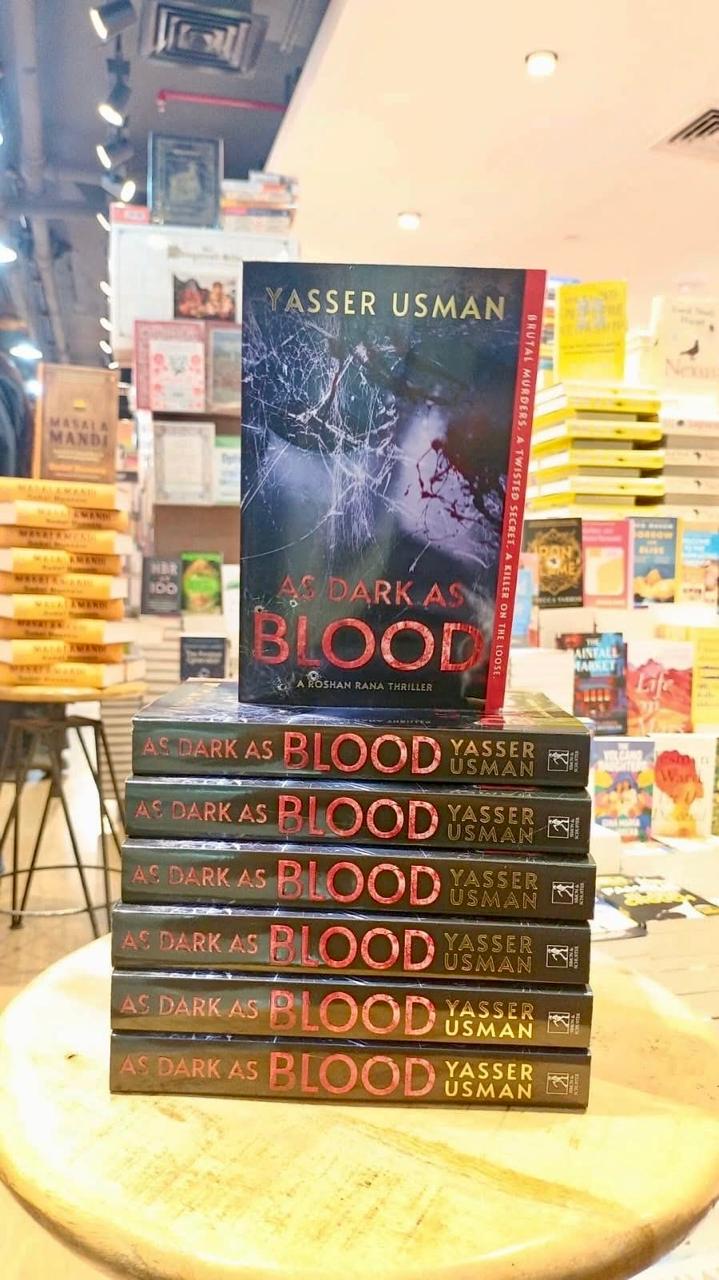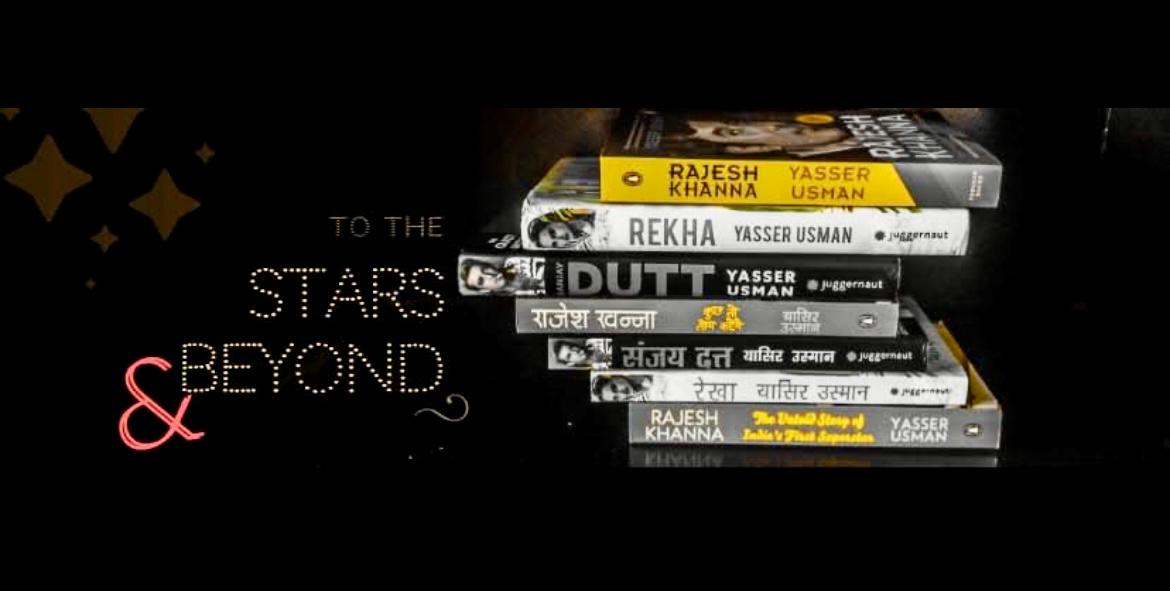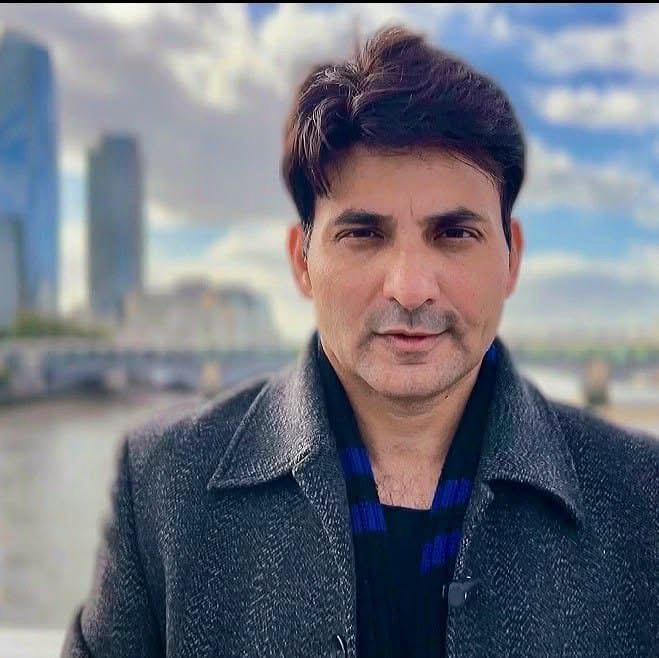Yasser Usman is an award-winning journalist, film biographer, and novelist. His last book Guru Dutt-An Unfinished Story was a critically acclaimed bestseller. It followed his successful trilogy exploring different decades of Bollywood through the bestselling biographies of iconic stars: Rajesh Khanna, Rekha, and Sanjay Dutt. His meticulously researched biographies offer gripping and poignant portraits, capturing both the lives of film personalities and the essence of the film industry during their time. His books on Rajesh Khanna and Rekha were shortlisted for the Crossword Book Award. Yasser’s writings on cinema have been featured in prominent publications like Hindustan Times, The Hindu, Khaleej Times, and the BBC. He has been a recipient of the prestigious Ramnath Goenka Award for excellence in journalism, the Red Ink Award, and the News Television Award among many others. Yasser Usman has just launched his first work of fiction, As Dark As Blood, a gripping and emotionally charged crime novel, now available at a bookstore near you.
In an exclusive interview with Jyoti Jha; Sr. Editor, Today Magazine the award-winning journalist talks about the various aspects of film biographies and non-fiction shows.
Q.1 How has your journey been from a Science Graduate to an acclaimed author?
YU: A fulfilling journey as I see it! Having done my Master’s in Environmental Sciences which was a subject very close to my heart, I was always inclined towards writing and media which was booming by the time I passed out of college. TV and Media were growing fields and I did my Course in Mass Communication and joined various News Channels during which I worked in Newsrooms in my regular job for 20-22 years. As a TV Journalist, later in my career, I began writing. Since I was interested in Film Writing which had derived from my regular interactions with Film and TV personalities, interviewing them, interacting with them, and making TV shows with them, so it all seemed to be culminating when I began writing my very first book on the story of Rajesh Khanna. I pitched my idea to a reputed Publishing House, and it was accepted to be published. Once the book is out of a writer’s hands, it becomes history for the writer, and it follows its own fate, journeying through the perspective, acceptance, and appreciation of the readers. I have been lucky in that sense since my book was appreciated widely and became a Bestseller. Writing alongside my regular job was not very easy but the journey put together, has been a rewarding one.
Q.2 How has being a journalist shaped your thought process as an author?
YU: Whenever you want to tell a story, two aspects stand out to make it an effective and authentic storytelling; firstly, it should be as close to the reality and truth as possible, and secondly, how well the subject is researched, especially if I talk about non-fiction from a journalist’s point of view. When I wrote my books on Rajesh Khanna and Guru Dutt, I had to depend on secondary research by talking to their family, friends, acquaintances, people they had worked with, and old archives, etc. Since I was not new to this concept of research and authentic storytelling, given my experience and exposure in Media and Journalism, it was relatively easier and relatable to me, to base my writing process around that. There is no complete book in this world, where it can be said that nothing more could be added to it. As a storyteller, you try to cross the hurdles and difficulties and narrate a story as seamlessly and as convincingly as possible. You only try to give an overview and make it as wholesome as possible from your end.
Q.3 You have been the Editorial and Production Head of more than 120+ non-fiction television shows. How tough is it to grasp the audience's interest and attention in non-fiction shows as they can be devoid of larger-than-life elements?
YU: ‘Truth is stranger than fiction’, the world witnesses such bizarre things that a human mind cannot even fathom many times. Non-fiction can be very interesting in terms that earlier the news that would only sustain the confines of the newsrooms and channel headlines, has now become believable and crossed the cornerstones of OTT Platforms and Digital Channels. Despite being sensationalized many times, to make the subject more palatable and interesting, these tidings find a relatability with their audience. There aren’t many tools, techniques, and factors required to make non-fiction palatable, because they are related to life and find their connection with people. You only try to tell the story in such a way that it permeates through all strata of society and reaches the last link.
Q.4 What role does language play in expression through literary devices and media?
YU: Language is extremely important in any form of expression, and especially if we mention literary expression, then it is the lifeline of storytelling. The language should be such that it doesn’t restrict itself to the interpretation of intellectual class, but also, be comprehended by the masses. I come from a Hindi background, and I have extensively worked with the Hindi News Channels throughout my career, however, my writing journey steered more towards the English language. All my books are primarily in English, however, there are Hindi translations of many of them. Having lived in London for a long time, I have observed that people here mostly are well-versed in a single language, which is predominantly English. Whereas, In India, I believe, that we are lucky in the way that whoever goes to a school there, has an opportunity of learning more than one language. India has the specialty that most of us are multilingual, whether it is our mother tongue, regional language, or a commonly used conversational language! Whatever the language of expression, the emotion should connect with the readers and reach its audience. Language should connect people and not make them compete with one another.
Q.5 You have also worked as a Consulting Editor and Digital Content Strategist for CricketnMore.com. How do you see the sport of Cricket overshadowing all the other sports in the country?
YU: I don’t know if I am the right person to comment on this, however, it is undeniable that being an Indian, I know the nerve of the country and its admiration for cricket. While I was growing up during the eighties, India won its very first World Cup and then there was a persistent growth in the sport, which I think, was a major factor in creating the pulse for the sport in our country. That winning trophy is important to generate that feeling of pride and excitement. Although other sports weren’t in the limelight then, with time, that has drastically changed. I do not belong to any sports authority, but as a storyteller and someone who is intently interested in stories, I think storytelling on other sports through movies like Chak De India, Chandu Champion, etc. have contributed to creating that awareness. Things are changing and we are all witness to that. Every sport will have its timeline. There must be a turning point, belief, sense of pride, and patriotism!
Q.6 You have written biographies on the stalwarts of Bollywood. What challenges do we, as authors, face while writing about these stalwarts who have larger-than-life personas?
YU: My main aim as a writer is to humanize those larger-than-life figures. When I started writing about Rajesh Khanna, I did extensive research. He came from a normal background and struggled his way through the cinematic world, became the very first person to attain superstardom, and maintained his position for a long time, and then there was a prolonged phase of downfall which was traumatically painful. That pain of loss is like any normal person feeling that agony. I simply tried to bring that to the forefront, that it is a circle of life, and everything that can happen to a normal person is very much applicable to their lives too. They happen to touch our lives very closely, influence our thought processes and behavior, and mesmerize and affect us in certain ways, rule the celluloid for a given time, but then, they are all normal human beings.
Q.7 Are we going to see any biography of a Hollywood star by you?
YU: I do not have the context to portray any Hollywood personality. I have been very closely involved and influenced by the Hindi Cinema for decades. My interest, context, and involvement with Hindi cinema have built this background for me where I indulge in only Bollywood. I have seen Hollywood movies, have read relative books, and deeply appreciate their cinema. However, my expertise, interest, experience, and passion lie in Indian cinema. I am deviating from my series of Biographies, and my next book (releasing on 15th January), ‘As Dark As Blood’, is a Crime Fiction. When I began my career as a TV Journalist, I was associated with Crime Shows, Non-Fiction Crime Shows, and Crime Documentaries for a very long time, some of them being award-winning shows. I used to write, produce, and present the shows at different times. Influenced from there, and inspired by some true events, my book has taken structure and will soon hit the major bookstores. It is different from my previous genre and I look forward to a great journey for this book and hope it is as lucky as my previous bestsellers. I will appeal to the audience to read the book and give their reviews.






